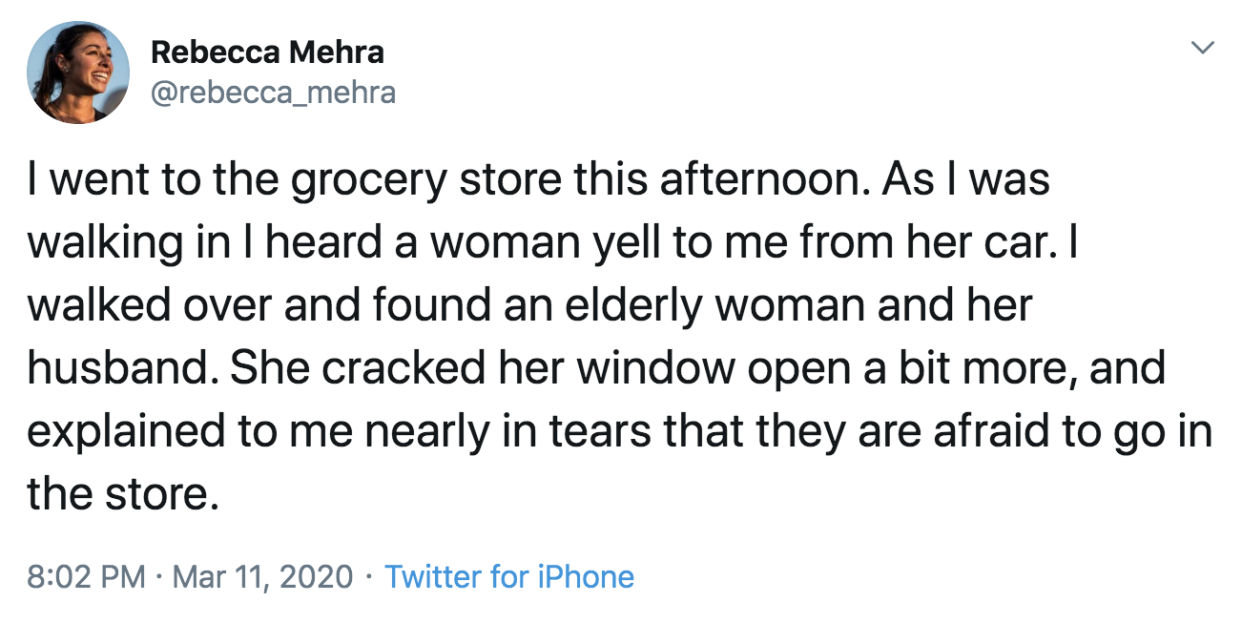Woman’s Viral COVID-19 Tweet Reminds Us to Practice Compassion Toward Older Adults

As cases of novel coronavirus (COVID-19) spread in the United States, high-risk groups—including older adults—are growing more concerned.
One elderly couple was even afraid to step into their local grocery store, per a viral Twitter thread from pro runner Rebecca Mehra.
“Offer to help anyone you can. Not everyone has people to turn to,” she wrote.
As the number of reported COVID-19 cases continues to rise in the United States, high-risk populations—especially older adults above the age of 50—are growing more concerned with protecting their health. In the case of one elderly couple, they’re afraid to even step into their local grocery store.
Rebecca Mehra, who shared their story in a viral Twitter thread, noticed the pair sitting in their car outside the store as she was going in. “I went to the grocery store this afternoon. As I was walking in I heard a woman yell to me from her car,” Mehra wrote. “I walked over and found an elderly woman and her husband. She cracked her window open a bit more, and explained to me nearly in tears that they are afraid to go in the store.”
Afraid to get sick as they are in their 80’s and hear that the novel coronavirus is affecting older people disproportionately. And that they don’t have family around to help them out. Through the crack in the window she handed me a $100 bill and a grocery list, and asked if I
— Rebecca Mehra (@rebecca_mehra) March 12, 2020
I know it’s a time of hysteria and nerves, but offer to help anyone you can. Not everyone has people to turn to.
— Rebecca Mehra (@rebecca_mehra) March 12, 2020
Mehra continued: “Afraid to get sick as they are in their 80s and hear that the novel coronavirus is affecting older people disproportionately. And that they don’t have family around to help them out. Through the crack in the window she handed me a $100 bill and a grocery list, and asked if I would be willing to buy her groceries. I bought the groceries and placed them in her trunk, and gave her back the change. She told me she had been sitting in the car for nearly 45 min before I had arrived, waiting to ask the right person for help.”
She ended her message by asking people to remember others, especially those who are extra vulnerable, in great times of need like these. “I know it’s a time of hysteria and nerves,” she wrote. “But offer to help anyone you can. Not everyone has people to turn to.”
Twitter users replied, thanking her for showing compassion. “Thank you for being the kind soul this couple needed today!” one person said. “This warmed my heart and also hurt my heart,” another added. “Kindness matters. We all get by with the help and support of our neighbors. Let’s look out for each other,” another responded.
Infectious disease expert Amesh A. Adalja, M.D., senior scholar at the Johns Hopkins Center for Health Security recently recently explained to Prevention.com that the majority of COVID-19-related deaths have occurred in the elderly. “Above age 50 is when you start to see more severe complications,” he said, adding that older patients have a harder time recovering. They’re especially susceptible if they also have underlying health issues, like heart and lung diseases, diabetes, and other immune-suppressing conditions.
As the Centers for Disease Control and Prevention continues to learn how the novel coronavirus spreads, here are some precautions you can take to help you and others stay as healthy as possible:
Wash your hands frequently using soap and water for at least 20 seconds.
If you’re in a pinch, use hand sanitizer that contains at least 60% alcohol.
Avoid close contact with anyone who appears to be sick.
Cover your cough or sneeze with a tissue, then throw the tissue in the trash.
Clean and disinfect frequently touched objects and surfaces.
Talk to your doctor if you develop symptoms within 14 days of returning from a country with a COVID-19 outbreak.
Stay home if you develop cold or flu-like symptoms.
Avoid nonessential travel to areas with active COVID-19 outbreaks.
Visit the website for your local health department to make sure you are getting accurate updates.
If you are caring for an older adult specifically, the CDC recommends the following:
Know what medications your loved one is taking and see if you can help them have extra on hand.
Monitor food and other medical supplies (oxygen, incontinence, dialysis, wound care) needed and create a back-up plan.
Stock up on non-perishable food items to have on hand in your home to minimize trips to stores.
If you care for a loved one living in a care facility, monitor the situation, ask about the health of the other residents frequently and know the protocol if there is an outbreak.
Like what you just read? You’ll love our magazine! Go here to subscribe. Don’t miss a thing by downloading Apple News here and following Prevention. Oh, and we’re on Instagram too.
You Might Also Like

